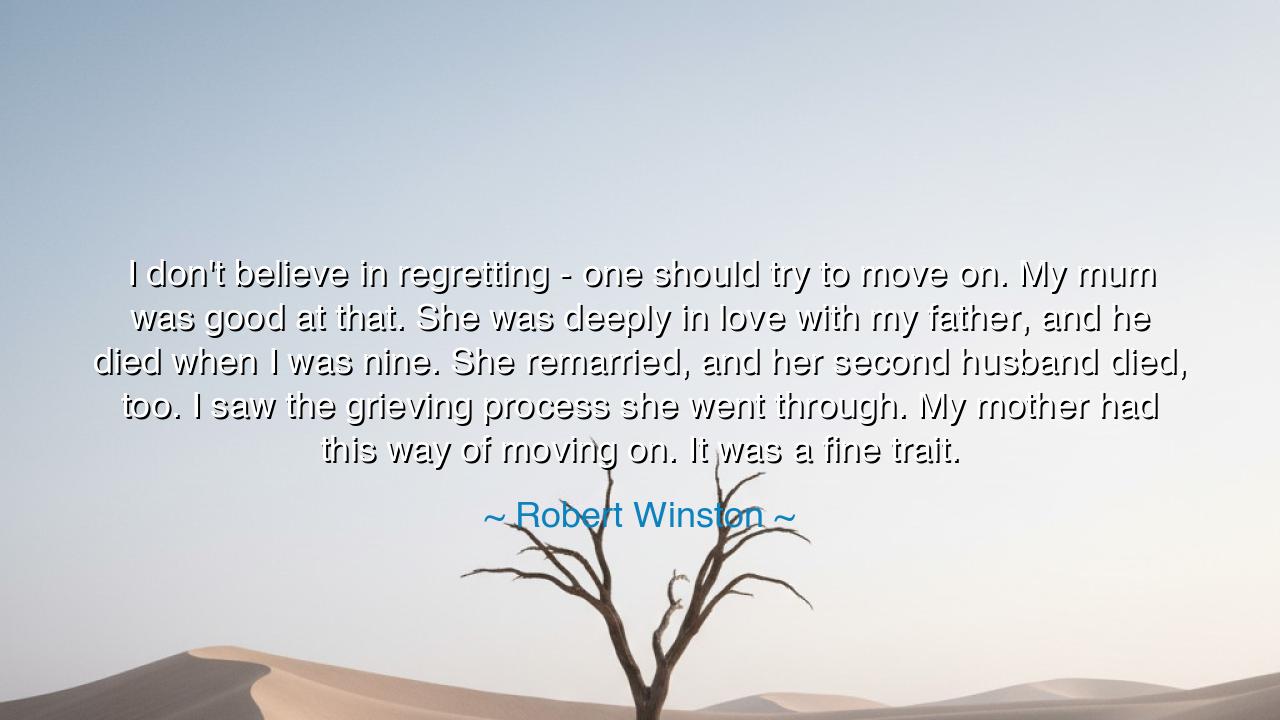
I don't believe in regretting - one should try to move on. My
I don't believe in regretting - one should try to move on. My mum was good at that. She was deeply in love with my father, and he died when I was nine. She remarried, and her second husband died, too. I saw the grieving process she went through. My mother had this way of moving on. It was a fine trait.






In these words of Robert Winston we hear not merely the voice of one man, but the echo of ages, for the wisdom he speaks is carved from the trials of life itself. To move on without regret is not to forget, nor to harden the heart, but to recognize that life, in its ceaseless flowing, permits no man or woman to remain forever bound to sorrow. His memory of his mother, twice bereaved, yet strong enough to embrace life anew, is a tale as old as humanity: grief will come, but it need not be the end of us. This is the teaching—that strength is not in denial of pain, but in the courage to rise again from its depths.
The ancients, too, understood this. When Achilles lost Patroclus, he was consumed by rage and despair, but even he, the mightiest warrior of the Achaeans, could not remain in mourning forever. War called, life pressed onward, and though his heart was broken, his hands still wielded the sword. In this way, we see that even the greatest of men are compelled to walk forward through the valley of grief, for to remain is to perish. Thus, Winston’s words are kin to Homer’s verses, affirming that sorrow may cut deep, but the spirit must mend and march on.
There is also in this quote the figure of the mother, the bearer of silent endurance. Twice she faced the grave, twice she buried the one she loved most, and yet she did not sink beneath the weight of her loss. Instead, she demonstrated the sacred art of renewal. In her, the son beheld a lesson more powerful than any spoken teaching: that life grants us the grace to begin again, even when the past seems too cruel to release. Such examples are rare jewels, for they show us that strength is not loud nor boastful—it is quiet, steadfast, and unyielding.
Consider also the tale of Marcus Aurelius, the philosopher-emperor, who lost many children in infancy. His grief was real, his sorrow heavy, yet he counseled himself and his people to accept the fate woven by the universe. "Do not act as if you were going to live ten thousand years," he wrote. His wisdom was not cold resignation, but a call to live fully in the present, without regret. So too does Winston remind us: regret binds us to what cannot be undone, while action frees us to embrace the life that remains before us.
To grieve is human, but to let grief define us is to surrender our sacred gift of resilience. The heroic mother in Winston’s tale proves that we may suffer, yet still rise; we may mourn, yet still love again. Her trait was not indifference, but the noble discipline of moving forward. Imagine the child who watches such strength: the lesson imprints itself like fire upon the soul. For it tells the young that even in the darkest night, dawn will come, and one must be ready to greet it.
From this quote we also learn of the power of example. A mother who carries her burden with dignity plants courage in the heart of her son. A leader who endures hardship without bitterness inspires his people. And so, we are all called to embody such strength, for others are watching. Our way of enduring loss will become the wisdom of those who follow us. In this sense, every act of resilience becomes a teaching, every refusal to drown in sorrow a beacon for another’s path.
The lesson is clear: do not live in regret. Honor the past, grieve what is lost, but let the current of life carry you forward. Just as a river carves valleys not by standing still, but by flowing onward, so must we continue our journey. Practically, this means allowing ourselves to feel the pain, but not to remain its prisoner. Speak to trusted friends, write the burden in a journal, set new tasks for your hands—whether great or small. For motion itself is medicine, and each step forward is a victory over despair.
Thus, let all who hear these words remember: the trait of moving on is not weakness, but one of the finest strengths of the human spirit. Carry it with you. When sorrow comes, as it surely will, bow your head in grief, but do not tarry long in that shadowed place. Rise, as Winston’s mother rose. Walk forward, as the wise have always done. And let your life become the proof that no sorrow, however deep, can silence the song of the living heart.






AAdministratorAdministrator
Welcome, honored guests. Please leave a comment, we will respond soon